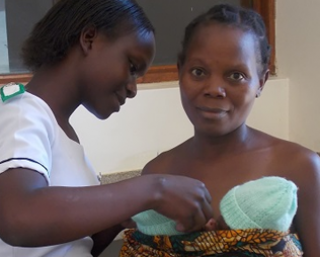Project Summary
Evidence for Action (E4A) is a five year programme which aims to improve maternal and newborn survival in six sub-Saharan countries. Funded by the UK Department for International Development, it focuses on using better information and improved advocacy and accountability to save maternal and newborn lives in Ethiopia, Ghana, Malawi, Nigeria, Sierra Leone and Tanzania.
Maternal mortality is the most off-track of the Millennium Development Goals and progress on maternal and neonatal mortality in most African countries has stalled. Approximately 50% of all maternal deaths worldwide occur in sub-Saharan Africa with national rates of neonatal mortality the highest in this region. Women in sub-Saharan Africa have a 1 in 13 lifetime risk of dying during pregnancy or childbirth compared to 1 in 4100 in industrialised countries. The region also has the highest maternal mortality ratio among developing regions at 640 deaths per 100,000 live births. Every year about 7.6 million children, under the age of 5 will die and about 46% of the deaths occur in sub-Saharan Africa.
There has been little progress on reducing neonatal deaths in Africa, with the smallest reduction in rates (1%/year) globally between 1990 and 2009. Slow progress in reducing maternal and newborn mortality is linked to weak political commitment and weak accountability, both underpinned by lack of data. Maternal mortality reduction in countries across the world has always been associated with increased political focus and use of good data. In Africa, where data is generated it is often not in an accessible form for policy makers and advocates.
Accountability mechanisms are usually not strong. Over the past two years, there has been unprecedented attention to the high maternal and newborn mortality rates. Globally $40 billion has been pledged. The UN Secretary General has launched the Global Strategy for Women and Children.
Our approach focuses on better evidence, strengthened advocacy and sustained accountability. Better access to data will impact on maternal and newborn health indirectly through multiple routes. At the political level robust evidence will provide definitive credible indicators which will be publicly available. These data will inform accountability mechanisms; be used by advocates and political champions to reinforce messages and broker solutions. At the technical level, robust evidence will help foster political and strategic consensus, articulate the case for more or more efficiently applied resources, and strengthen the accountability of health professionals.
The evidence used will mostly drawn from existing sources, but some primary data may need to be collected if existing data is considered to be insufficient. In addition, there will be better systems for international accountability against agreed benchmarks. A national coordinated advocacy campaign to highlight service delivery inadequacies and celebrate improvements in health outcomes will be run in each country. Advocacy campaigns will be tailored to the local context and the type of engagement with accountability processes will be shaped by local accountability structures.
In the six countries maternal and neonatal health will become a political issue. Leaders, policy makers, managers and those providing services will feel increasingly accountable for meeting commitments and addressing service delivery inadequacies. Better evidence of where and why women and newborns are dying will be available and accessible to all. The data will reveal service delivery bottlenecks and the increased attention will strengthen the political will to address them.
Expected results in the six countries include at least a 400% increase of media reports on performance of maternal and neonatal health, quality maternal death audits systematised, national advocacy campaigns on maternal and neonatal mortality reduction, evidence based planning at all levels, increased allocation of resources to maternal and neonatal health, increased production of needed health workers, and decreased stock outs of essential drugs. Access to life saving quality emergency obstetric care will consequently increase, leading to a reduction in maternal and neonatal mortality.
 Close
Close


